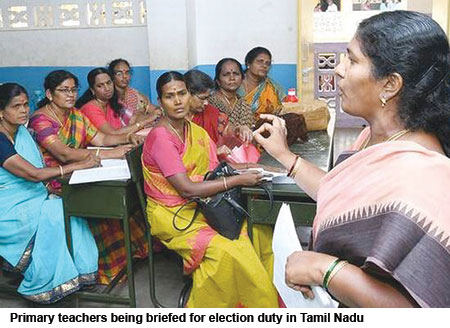
According to an end June study, Time Allocation and Work Perceptions of Teachers, prepared by the Delhi Commission for Protection of Child Rights (DCPCR) in collaboration with the Accountability Initiative (AI) of the Centre for Policy Research (CPR), Delhi, school teachers — especially government school teachers — are heavily overburdened with administrative and clerical work which leaves them little time to discharge their core duty of teaching children. AI conducted a three-phase survey of over 200 school teachers employed in 39 state government (12 schools), municipal corporation (24) and government aided (3) schools in Delhi state.
“This is one of the pioneering studies in the field of understanding teachers’ time distribution in schools — an area that continues to be under-researched, especially in an Indian context. This study seeks to fill that gap,” writes Ramesh Negi, chairperson of DCPCR, in the foreword of the report.
The study reveals that in addition to discharging their core teaching duty, teachers are also required to contribute time for administrative work such as maintaining student attendance records, test scores and enrolment data. Of the 200 teachers studied by AI field researchers, 31 percent opined that maintaining student records shouldn’t be a teacher’s duty at all, particularly since supervising the free mid-day meal is a time-consuming task, especially for primary school teachers.
Apart from maintaining student records, teachers in government schools are also loaded with administrative and clerical duties such as opening bank accounts, updating students’ Aadhaar IDs, distributing and maintaining records of uniforms, scholarships, books and responding to education ministry circulars, says the study. Moreover, government school teachers also have to make time to interact with parents, officials and members of School Management Committees established under the Right of Children to Free & Compulsory Education (RTE) Act, 2009.
“The non-teaching administrative duties imposed on teachers are piling up. We have to do clerical work at school, assist with the mid-day meal, Aadhaar enrolment and multiple other official jobs. This leaves very little time to prepare lesson plans,” says Naveen Sangwan, general secretary of the All Delhi Primary Teachers’ Association.
The authors of the DCPCR-CPR report offer several guidelines to reduce the non-teaching load of government school teachers. Among them: administration and management workshops for principals; preparation of the annual school calendar by the department of education (DoE) to enable teachers to plan their schedules, and reducing teachers’ time spent on recordkeeping tasks by assigning data management responsibilities to administrative personnel or outsourced parties. “DoE should consider setting a norm to ensure teachers do not spend beyond more than 30 percent of their time on non-teaching activities. This norm will serve as a benchmark,” says the DCPCR-CPR report.
It’s not that education ministries in the states have not repeatedly been advised to refrain from increasing the non-teaching workload of government school teachers. The RTE Act clearly states that “no teacher shall be deployed for any non-educational purposes other than the decennial population census, disaster relief duties or duties relating to elections to the local authority or state legislatures or Parliaments, as the case may be.”
Likewise, the Kasturirangan Committee’s report warns against “overburdening” teachers and advises that they must be given “robust opportunities for CPD (continuous professional development)”. “Teachers should not be overburdened, especially with non-teaching activities, or with teaching of subjects outside of their expertise,” it warns.
Against this backdrop of the country’s 6 million government school teachers being piled with administrative and public service duties, the DCPCR-CPR study has come as timely warning to the newly sworn-in BJP/NDA government at the Centre, which is studying the KR Committee’s 477-page report prior to finalising the long overdue NEP 2019.
Autar Nehru (Delhi)